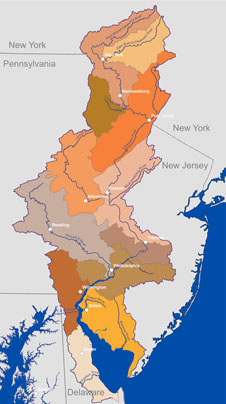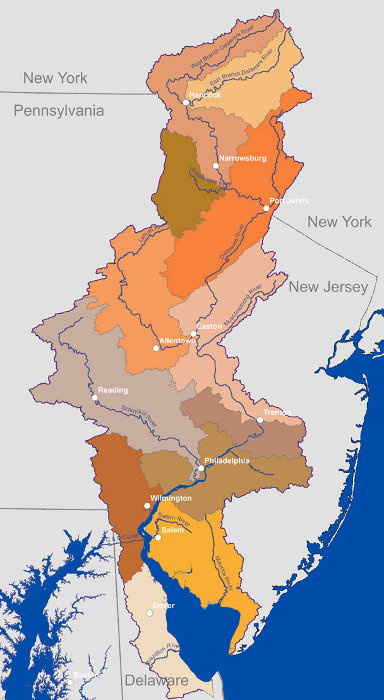Source Water Collaborative Forum
Delaware River Basin Water Resource Protection
Conference Agenda: March 10, 2011
Regional Location: Rutgers EcoComplex
Bordentown, New Jersey
| 7:45am: | Arrival and Registration at Each Location |
| First Session: Live in Philadelphia and Broadcast to All Regional Locations See Main Agenda for First Session Topics | |
| 10:45am - 11:00am: | BREAK |
| Transition to Regional Activities | |
| 11:00am - 12:15am: | Managing rainwater runoff to protect drinking water supply at low cost. (Dr. Christopher Obropta, Rutgers University, NJ Agricultural Experiment Station) |
| Stormwater Opportunities, Cost or Benefit: The Choice is Yours. (Todd Kratzer, New Jersey Water Supply Authority; Paul Pogorzelski, Hopewell Township) |
|
| Lawn Watering Made Easy: The ET Index Program. (Kenneth Taaffe, South Jersey Resource Conservation and Development Council) |
|
| Questions and Answers for Panelists | |
| Return to Philadelphia for Keynote Live Broadcast and Lunch See Main Agenda for Lunch Session Topic |
|
| 1:30pm: | RETURN TO REGIONAL ACTIVITIES FOR BREAKOUT SESSIONS |
| Transition to Regional Activities | |
| 1:30pm - 3:15pm: | Facilitated discussions of local issue priorities and strategies for local action to protect drinking water quality and quantity. Breakout sessions for particular topics, so attendees can discuss with each other how to move ahead on local action. (Facilitators: Branden Johnson, Stuart Nagourney and Rebecca Jones, NJDEP) |
| 3:15pm - 3:30pm: | BREAK AND REGIONAL LOCATION SUMMARY REPORTING TO PHILADELPHIA |
| Return to Philadelphia and Closing | |
| 3:30pm - 4:00pm: | Regional Summary Reports Summary of Forum Discussions and Future Direction Victoria P. Binetti, Associate Director, Water Protection Division, Region 3, US Environmental Protection Agency |
| 4:00pm: | ADJOURN |
Speaker: Dr. Christopher Obropta, Rutgers University, New Jersey Agricultural Experiment Station
Title: “Managing Rainwater Runoff to Protect Drinking Water Supply at Low Cost”
Abstract: Rutgers Cooperative Extension is working with counties, municipalities and citizens to install low cost "green infrastructure" methods that will detain rain water runoff and enable it to soak into the ground. Naturalizing detention basins or installing a rain garden infiltrates stormwater onsite rather than running off directly to a stream. This helps to enhance the local groundwater supply, aquifer, and surrounding ecosystem.
Bio: Dr. Obropta has a background in watershed management, water quality modeling, hydrologic and hydraulic modeling, and coastal engineering. His specific experience includes watershed restoration, wasteload allocations and TMDL studies, storm water management, wetland design, effluent dilution analyses, longshore sediment transport, computer-aided design, and Geographic Information Systems (GIS). Dr. Obropta has spent the last six years focusing his efforts in the field of watershed management. He has secured numerous grants to implement watershed restoration projects. These projects have included the design of Best Management Practices (BMPs) including storm water treatment wetlands, bioretention systems, in-line treatment systems and riparian buffers. Along with the design and construction of BMPs, many of these projects incorporate soil bioengineering techniques for stabilizing eroding stream banks and restoring natural channels. These projects have required Dr. Obropta to work closely with municipalities, counties, NJDEP and nonprofit grass-roots organizations. During his work in the field of watershed management, Dr. Obropta has had the opportunity to build partnerships, conduct detailed stream corridor analyses, prepare grant applications, design BMPs, secure permits, supervise construction, and conduct long-term monitoring in watersheds throughout New Jersey.
Speaker: Todd Kratzer, New Jersey Water Supply Authority; and Paul Pogorzelski, Hopewell Township
Title: “Managing rainwater runoff to protect drinking water supply at low cost”
Abstract: The NJ Water Supply Authority works with many local, state, federal, and university experts to develop remediation strategies for controlling or eliminating stormwater runoff. To minimize and reverse degradation to the land, and ultimately our waterways, from uncontrolled runoff requires a long-term commitment from each of us. In partnership with a highly regarded expert from Hopewell Township, New Jersey, the Authority's Watershed Protection Division will present an overview of the causes, effects, and successful remediation efforts for controlling stormwater runoff.
Bio: Todd W. Kratzer, P.E.has received a BS in Environmental Resource Management and a Master of Environmental Pollution Control from the Pennsylvania State University. He is a registered professional engineer, and has the title of Senior Watershed Protection Specialist in the Watershed Protection Programs Division of the NJ Water Supply Authority. He has been active in numerous storm-runoff control projects, or "non-point" pollution controls. For more than 24 years, he has been developing techniques for the prevention or remediation of point and non-point sources of pollution in cooperation with the Delaware River Basin Commission, the National Park Service, the NJ Department of Environmental Protection (NJDEP), and the NJ Water Supply Authority. Currently, he is partnered with NJDEP, 5 municipalities, 2 universities, and federal and county agencies for the development of innovative techniques to control/prevent storm runoff in rural watersheds underlain by shallow soils and fractured bedrock, specifically the Lockatong and Wickecheoke Creek Watersheds, Hunterdon County, NJ.
Bio: Paul E. Pogorzelski, P.E., is the Administrator/Engineer for Hopewell Township, Mercer County and has held that position since 2007. He previously worked for 28 years in the private sector as consultant to the municipal and private sectors. He is a New Jersey licensed professional engineer and planner, a certified municipal engineer and public works manager. He has 32 years of experience in public works engineering and municipal land use in . Paul has partnered with the NJDEP on a 319 grant porous pavement demonstration project, designed the first underground stormwater basin in the Wissahickon Watershed within the Philadelphia City limits, helped research and implement one of New Jersey's most recent center based development project- the Robbinsville Town Center and has been using sustainable development practices since the mid 1980s. He has served as advisor to several State Committees including the BMP subcommittee as well as the Stony Brook Millstone Watershed.
Speaker: Kenneth Taaffe, South Jersey Resource Protection and Development Council
Title: “Lawn Watering Made Easy: The ET Index Program”
Abstract: The South Jersey RC&D Council and the United Water Company operate a Lawn watering Program called the ET Index Program. This is a simple, but scientific program designed to give accurate estimates of lawn irrigation needed, every third or fourth day. Its simplicity is that the Council announces on its website how many minutes to irrigate every day of the summer for a typical lawn sprinkler. The United Water Company also announces this value on a phone hotline, local papers, and radio stations. After rolling out this program in Toms River in 1998, the United Water Company found that peak water usage has declined in subsequent years, though the population of Toms River has grown by 60% since 1998. The science behind the ET Index Program is that the EvapoTranspiration rates and precipitation amounts are measured daily at their research grade weather stations for prior days.
Bio: Ken Taaffe is the technical liaison/coordinator to the South Jersey Resource Conservation and Development Council (www.sjrcd.org), working for the U.S. Department of Agriculture, Natural Resource Conservation Service. He earned a Master's in Forestry from Duke University, and works with varied organizations in South Jersey on projects protecting soil and water quality.
Adobe Flash Player is required to view the webcast click here to download the plugin. Try this test video to see if your computer meets the requirements to view the live webcast.


